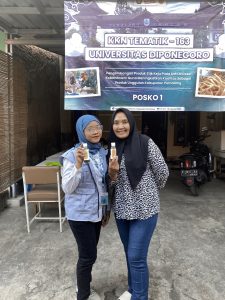
Kebondalem, Pemalang – In the framework of the Thematic Community Service Programme (KKN) Team 163 Diponegoro University, student Amelia Syahrani from the Department of Industrial Chemical Engineering Technology successfully implemented green technology on a small and medium industrial scale in a multidisciplinary work program that focuses on optimising the maintenance of cooking utensils for local MSME players. The work programme conducted on Thursday, 31 July 2025 entitled “Optimisation of Cookware Maintenance Based on Anti-rust and Anti-stick Cleaner Formulations” was an initiative that originated from the proposal of KKN Field Supervisor, Sri Risdhiyanti Nuswantari, S. Tr. T., M. T., who observed the problematic maintenance of production equipment in food MSMEs, especially the accumulation of fat residue and the formation of corrosion on metal surfaces that can reduce production efficiency and product quality, and saw the potential for developing practical solutions for micro-enterprises.
The main target of this programme is the Cheese Sticks MSME located in Kebondalem Village. Pemalang Subdistrict, Pemalang Regency, with the main partner Mrs Maharani as the business owner. Through a simple yet effective technological approach. Amelia developed a natural cleaning formulation conusting of baking soda, moringa leaf powder, neem leaf powder, and vinegar. According to Amelia, the selection of these ingredients has a rationale in the mechanism of action of the cleaning fluid in use. Sodium bicarbonate (NaHCO) was chosen as the main component based on its amphoteric properties that allow regulation of the system’s pH in the range of 8.1-8.4. the optimal condition for the cleaning process without causing excessive corrosion to the metal substate. The reaction kinetics with acetic acid produces CO, which acts as a lifting mechanism for contaminant particles. Moringa oleifera leaf extract contains the bioactive compound quercetin (CHO) with an acid dissociation constant (pKa) of 6.31 which allows optimal antioxidant activity at system pH. The oxidation inhibition mechanism occurs through electron donation to free radicals, preventing the propagation of oxidation reactions on metal surfaces. Neem leaves (Azadirachta indica) contribute through azadirachtin compounds that have a limonoid structure with epoxide groups that are reactive to the enzymes of microorganisms, resulting in a biocidal effect with a low minimum inhibitory concentration (MIC). D-limonene in lemon oil exhibits hydrophobse properties with a log P value of 4.83, allowing effective penetration into the lipid and triglyceride layers accumulated on the surface of cookware. The degreasing mechanism occurs through fat solubilisation based on the “like dissolves like” principle
This innovative liquid cleaning product is specifically designed to overcome rust and stickiness problems on cookware that are often faced by MSME players. while offering an environmentally friendly and economical cleaning alternative This work programme validates the concept of appropiate technology that integrates chemical engineering principles with environmental sustainability, włale providing practical solutions to the problems of small-scale industries. This approach is in line with the Industry 4.0 paradigm that emphasises process efficiency and envuvumental impact minimusation through the utilisation of renewable raw materials. The unplementation of this programme is expected to improve the operational efficiency and product quality of partner MSMEs, as well as make a real contribution to the development of the local economy in Pemalang Regency.
This Thematic KKN programme shows Diponegoro University’s commitment to applying knowledge to provide direct benefits to the community, especially in supporting the development of MSMEs as the backbone of the regional economy.

Recent Comments